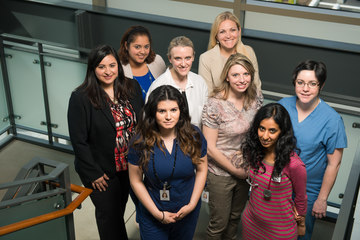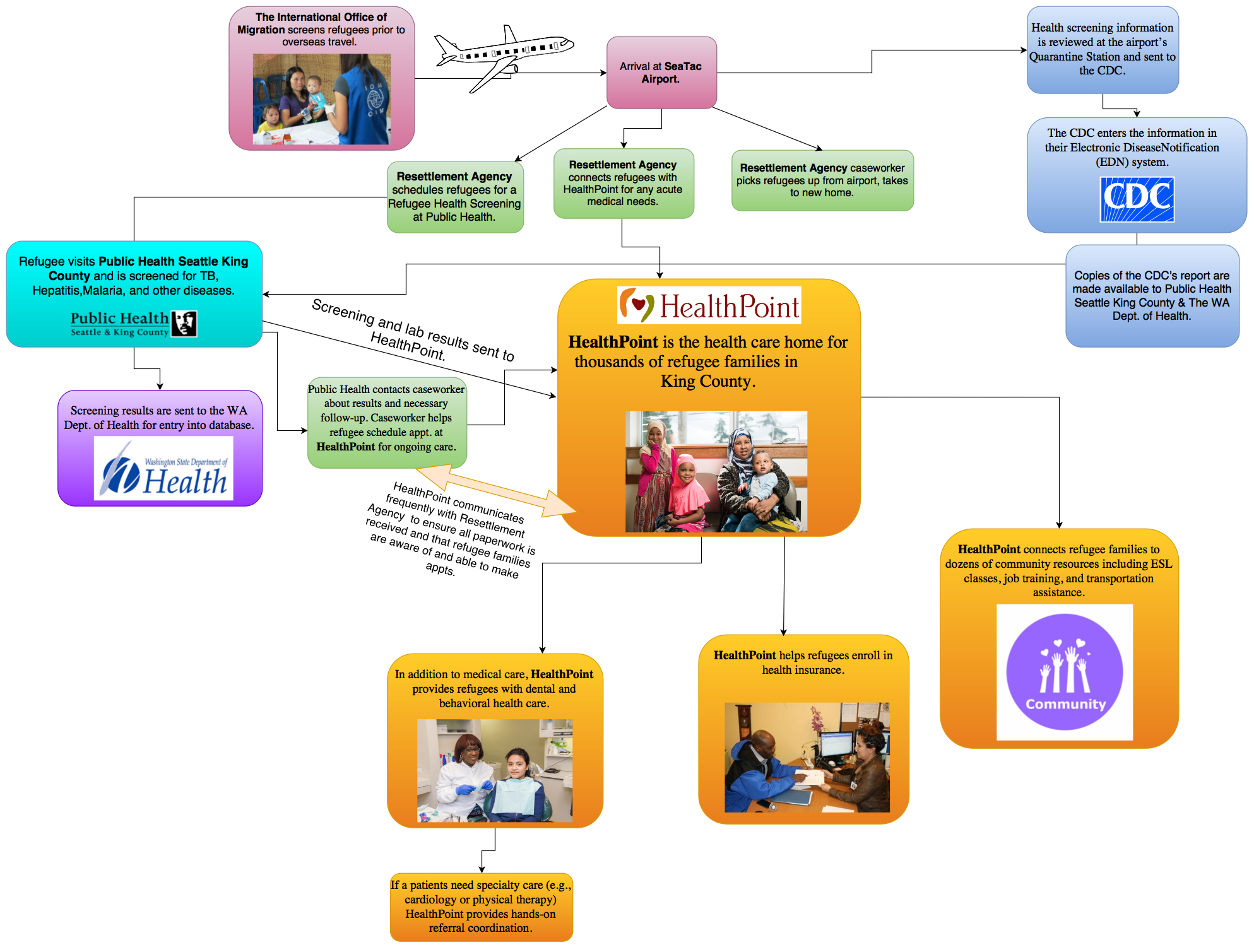According to the UN, there are currently more than 21.3 million refugees in the world. Living in King County, near one of the most prosperous cities in one of the most prosperous countries in the world, this global crisis can sometimes feel far away. Not so for HealthPoint clinics and staff..png)
In 2016, a little over 2,000 refugees were resettled in King County. Of those, more than half were seen at HealthPoint clinics. To put this in perspective, HealthPoint serves less than 4% of the King County population, but serves approximately 58% of the county’s newly resettled refugee population. You might wonder: why does HealthPoint serve such a disproportionately large number of our region’s refugees? The answer is that because of our mission, locations, and resources, HealthPoint is uniquely suited to meet the needs of refugee patients.
Historically, many refugees resettled in south Seattle neighborhoods such as Beacon Hill and the Rainier Valley. However, with the rising cost of living in Seattle, many resettlement agencies moved farther south in search of more affordable housing for their clients. With eight clinics in south King County and several decades of experience meeting the health care needs of a highly diverse patient population, HealthPoint was in the right place, with the right focus, at the right time.
So what does it mean to be an effective health care home for many of our region’s newest and most vulnerable residents? First and foremost it means lots of collaboration and cooperation. There are many different agencies involved in the resettlement process and assisting refugees with the wide range of material, cultural, physical, and emotional challenges they face upon arrival. For context, it’s important to understand that newly arrived families have only 90 days of assistance from a resettlement caseworker. During that time they must rapidly transition into their new lives by completing legal paperwork, enrolling their children in school, finding jobs, connecting to medical and social services, and generally figuring out how to get around and get by in a new place with a new culture and new language. It is a tall order for anyone, let alone families that are often struggling with effects of severe trauma.
To help us provide coordinated and culturally-sensitive care for our refugee patients, a few dedicated HealthPoint providers are proud and active members of New Arrivals Working Group (NAWG). NAWG is a collaboration of medical providers, staff from refugee resettlement agencies, mental health agencies, local transportation agencies, county and state health departments, the state Office of Refugee and Immigrant Assistance, and ethnic-based community organizations. The group meets bimonthly to identify and solve challenges associated with providing health care for refugees. HealthPoint providers have also presented on behalf of NAWG at the North American Refugee Health Conference.
Another way we serve our refugee patients is by providing them with care that is tailored to their needs and challenges. To help us do this, we’ve created a Department of Refugee & Multicultural Health which is directed by Dr. Liza Perpuse, a family physician at HealthPoint SeaTac. Dr. Perpuse and her team have brought greater focus to refugee health and helped HealthPoint develop the partnerships and processes necessary to effectively serve our growing number of refugee patients.
Refugee Health Clinics are one of the newest projects we’re working on. These clinics are special half-days where refugee families can come in and be seen together by both a physician and a behavioral health specialist. During the appointment, the family also receives referrals for dental care, assistance with insurance, and, if needed, prescriptions that are filled on-site by HealthPoint’s pharmacy.
The goals of the Refugee Health Clinics are to shorten the appointment wait-time for newly arrived refugee patients, reduce no-show rates, improve coordination of care, and help families feel  more comfortable. “When we’re able to schedule families, they seem to really respond well to that,” said Shoshana Aleinikoff, MD, a member of the Refugee Health Clinic project team at HealthPoint Midway. Dr. Aleinikoff explained that family appointments also make sense from a medical standpoint because “often the family has had a common migration experience, meaning exposure to similar diseases, and similar trauma. If one has been exposed to TB, there is a good chance that others have as well."
more comfortable. “When we’re able to schedule families, they seem to really respond well to that,” said Shoshana Aleinikoff, MD, a member of the Refugee Health Clinic project team at HealthPoint Midway. Dr. Aleinikoff explained that family appointments also make sense from a medical standpoint because “often the family has had a common migration experience, meaning exposure to similar diseases, and similar trauma. If one has been exposed to TB, there is a good chance that others have as well."
While it seems like a simple enough idea: seeing family members together to save time and increase comfort and convenience – it’s actually a fairly complex undertaking. Health Center Manager Magda Herrera de Leon explained that it starts with getting organized and allocating resources: “We block the schedules of not only the medical provider, but also our behavioral health intern because we know so many of the patients have experienced trauma.” Magda also makes sure that a second medical assistant is on staff for the Refugee Health Clinics to help with additional preparation, rooming, and data entry. In fact, the Refugee Health Clinics are truly a whole-clinic effort. “Even the pharmacy gets involved,” said Magda. “There are certain medications that refugees frequently need and so we make sure the pharmacy knows when the Refugee Health Clinics are coming up so that they can be prepared.”
While clinicians take center stage in providing care to our refugee patients, behind the scenes HealthPoint support staff are responsible for an immense amount of legwork to make the clinics a success. “We are constantly calling and emailing with caseworkers,” said Deborah García Vizcarrondo, Front Office Supervisor at HealthPoint Midway. The resettlement agency caseworkers are our primary point of contact with the families because they are working so closely and intensely with them during their first 90 days in the country. In addition to continual communication with caseworkers to ensure that families are aware of their appointments, the Front Office staff is also responsible for making sure HealthPoint has all the medical records from Public Health (so that our doctors can review them in advance), scheduling interpreters, and often arranging transportation to and from the clinic. It’s a lot of work, but it’s paying off. The kept-appointment rate for newly arrived refugee appointments was only 50% before the Refugee Health Clinics began; now it’s over 90%.
The pay-off goes beyond increased efficiency. The family environment and longer appointments mean more face-time with a physician and more opportunities to build trust and rapport. Dr. Aleinikoff explained that the clinics are about more than providing immunizations, prescriptions, and referrals; they’re also about “being stewards of a welcoming America.” “When I meet with newly arrived refugee patients, I tell them ‘I am so glad you're here. This is a safe place.’ I feel like doing whatever we can to be welcoming and counter the negative rhetoric that’s out there, is probably just as important as any medical care we provide.”
Indeed, for families who have known fear and uncertainty for so long, feeling welcomed and safe is not just a nicety; it’s a necessary precursor to achieving good health. A patient once told us that, when you’re newly arrived to this country, everyone that you meet is a representative of America. Our goal is that HealthPoint provides a positive and welcoming representation of our country and a first step towards a better and healthier life here.
HealthPoint's Role in Refugee Health & Resettlement

Take Action to Support HealthPoint Patients
There are many actions, big and small, symbolic and concrete, that you can take to support HealthPoint’s refugee patients:
- Learn more about the people arriving in our region and the challenges they face. Here are a couple of resources recommended by the Refugee Health Clinic team:
- Refugee Resettlement Fact Sheet – Created by the UN Refugee Agency.
- Upon Arrival – A Public Radio story about what it’s like for newly arrived families during their first months in King County.
- Advocate. Use your voice to create change for refugees. Visit, call, email, and tweet your elected officials to let them know that your community welcomes refugees.
- Don’t know a phone number? Text your zip code to (520) 200-2223 and you’ll be sent a complete list of phone numbers for your state and federal senators and representatives.
- Unsure what to say? World Relief Seattle has some suggestions for how to advocate effectively.
- Support compassionate, comprehensive health care for refugees resettling in King County by donating to HealthPoint.
- Assist refugee resettlement by volunteering your time and talent. These are a few of the incredible organizations we collaborate with to best serve our refugee patients:
- Help refugees settle into their new homes by organizing a clothing or household goods drive. Check with individual resettlement agencies like Jewish Family Service for a list of their current needs.
- Stand in solidarity with refugees by encouraging others to join HealthPoint in signing the Northwest Immigrant and Refugee Health Coalition’s Statement of Support.
